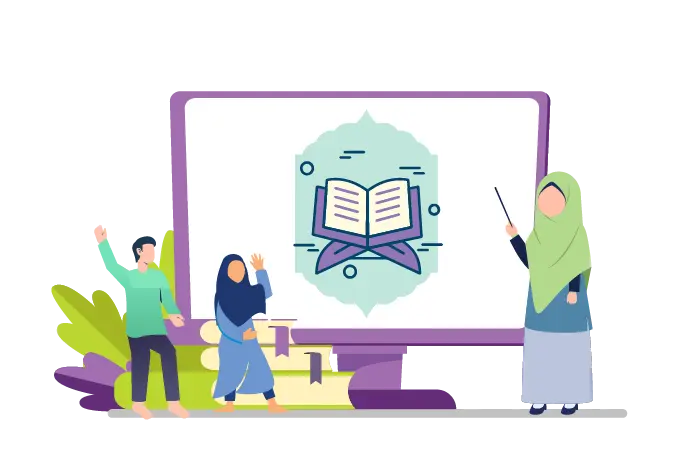Short Islamic Courses – In a world where every moment counts. The pursuit of knowledge often finds itself taking a backseat. Yet, Islamic studies emerged as the bridge to overcome this challenge through the advent of Short Islamic Studies Courses. These digital platforms, exemplified by the certificate in Islamic studies, a wealth of learning to your fingertips, promising an enriching experience even amidst life’s busyness.
Hadith: “The seeking of knowledge is obligatory for every Muslim.” (Sunan Ibn Majah)
Power of Short Islamic Studies Courses
In the whirlwind of contemporary life, carving out space for extensive commitments proves to be a formidable task. Enter the spotlight: Short Islamic Studies Courses. These courses present a concise yet comprehensive educational approach. Often accessible as online Islamic studies classes, they’re carefully designed to swiftly, yet profoundly, address core principles. The magic lies in their efficiency – in a brief span, participants submerge themselves in the very essence of Islamic teachings. These courses unlock a gateway to profound understanding without demanding extensive time investments, an invaluable asset in our fast-paced world.
Glimpse into the Array of Short Islamic Studies Courses
Islamic studies, a vast universe spanning theology, history, jurisprudence, and spirituality, invites exploration. Short courses within this realm shimmer with captivating diversity. They provide participants with a passport to traverse a spectrum of topics, all intricately woven into the fabric of Islamic studies. These courses offer a unique advantage, allowing learners to craft their educational journey in harmony with their passions. Whether the quest is to deepen understanding of the Quran, embark on the journey of Prophet Muhammad’s (peace be upon him) life, or untangle the threads of Islamic ethics, a tailored short course awaits. This rich tapestry of learning opportunities caters to curious minds eager to unravel the intricate mosaic of Islamic knowledge.
Significance of Enrolling
The appeal of Short Islamic Studies Courses transcends their brevity. These courses are meticulously designed to ensure participants grasp the core tenets of each subject. By focusing on essential concepts, learners don’t merely accumulate surface-level insights; they cultivate profound, rooted comprehension. This holds particular significance for those aiming to fortify their personal faith or make more impactful contributions to their communities. The structured approach of these courses transforms them into potent tools for personal growth and community betterment.
The Symbiosis of Short Islamic Studies Courses
In the midst of our dynamic lives, the thirst for knowledge often faces off against daily obligations. This is where online learning steps in, spotlighting the charm of courses like local Islamic studies classes. These courses carry with them a unique asset – flexibility. They seamlessly adapt to your schedule, allowing you to learn at your own tempo. Whether you’re a dedicated student managing coursework or a committed professional immersed in a bustling career, Short Islamic Studies Courses hold the key to harmonizing life’s responsibilities with the pursuit of wisdom. They bridge the gap between life’s demands and the quest for understanding, granting you the liberty to explore the depth of Islamic teachings without disrupting your routine.
Conclusion:
The sphere of Islamic studies stands attuned to the rhythm of the modern individual. The emergence of Short Islamic Studies Courses and specialized programs marks the dawn of a new era of learning. These courses not only accommodate the swift pace of our lives but also enrich them with the profound wisdom of Islamic teachings. As the digital realm continues to shape education, these courses stand as a testament to the seamless coexistence of tradition and technology. So, dive into the realm of Islamic knowledge through short courses – your avenue to enlightenment amidst life’s bustling symphony.
FAQS:
1. Which Course is Best for Islamic Studies?
Selecting the ideal Islamic Studies course hinges on your individual interests and aspirations. The range of options is vast, encompassing foundational introductions to specialized in-depth explorations. If you’re seeking a solid grounding, a basic Islamic Studies course could be a fitting start. Alternatively, if you’re drawn to specific aspects such as Quranic Studies, Islamic History, or Ethics, there are courses tailored to those niches.
2. What Can I Do with an Islamic Studies Degree?
An Islamic Studies degree opens diverse avenues. Graduates often find roles as educators, researchers, religious leaders, or community builders. Armed with a profound comprehension of Islamic principles, you might contribute to interfaith dialogues, social initiatives, or even diplomatic efforts. Moreover, an Islamic Studies degree can deepen your personal spiritual journey by offering insights into your faith and cultural heritage.
3. What is an Islamic Studies Course?
An Islamic Studies course is a structured educational program that delves into the multifaceted aspects of Islam – from its historical underpinnings to its theological foundations, jurisprudence, spirituality, and beyond. These courses are thoughtfully designed to furnish students with a holistic understanding of the religion, its teachings, and its broader societal impact. Depending on the course’s level and focus, you might explore themes like the Quran, Hadith, Islamic philosophy, and the life of Prophet Muhammad (peace be upon him).
4. How Long is a Degree in Islamic Studies?
The duration of an Islamic Studies degree hinges on factors such as the program level and the academic institution offering it. An undergraduate degree, like a Bachelor’s in Islamic Studies, typically spans around three to four years. A Master’s degree often takes one to two years, while a PhD program might entail several years of in-depth study and research. The timeline can also be influenced by your choice of full-time or part-time study. It’s advisable to consult specific universities for precise program durations.

